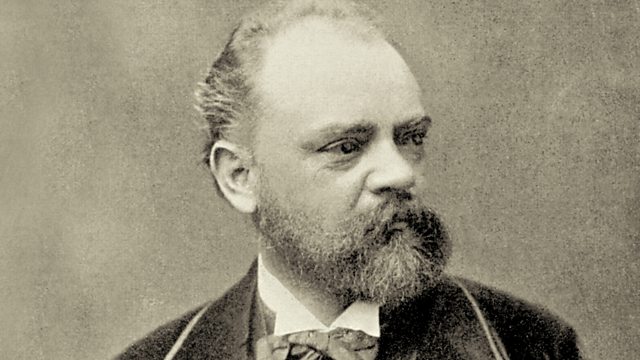
Notes from a small island
Donald Macleod looks at how visits to England changed Dvorak and brought him increasing fame.
Antonín Dvořák was no spring chicken when he found success as a composer. He was in his early thirties before he made his mark in his native Czech Republic, despite composing from a young age. Donald Macleod follows Dvořák as he attempts to win over successive audiences: from Prague to Vienna, England to America, before eventually returning to Prague and to the opera stage. Who did he need to impress in order to achieve the success he craved?
With the success of Dvořák’s breakthrough came difficulties, due to the high expectations of his friends and supporters. Little wonder that the Czech composer’s sights turned elsewhere, to England, and a chance to follow his own path.
Today Donald Macleod asks whether Dvořák’s visits to England led not only to increased fame but also to a greater sense of his own worth as a composer. We’ll hear from some of the works that delighted his English audiences, including an oratorio about a Czech saint and a setting of the Requiem Mass.
Dvořák’s success in England also allowed him to fulfil a dream of buying a bolthole in the country, a place that inspired his Eighth Symphony.
Czech Suite, Op 39 (Finale – Furiant)
Polish National Radio Symphony Orchestra
Antoni Wit, conductor
Stabat Mater, Op 58 (Quis es homo, qui non fleret)
Lívia Ághová, soprano
Marga Schiml, contralto
Aldo Baldin, tenor
Luděk Vel, bass
Prague Philharmonic Orchestra
Jiří Bělohlávek – conductor
Svatá Ludmila, Op 71 (What man is this whom lightening will not fell? & I beg thee, on thy dusty feet My lips I would lay)
Eva Urbanov, soprano
Prague Philharmonic Choir
Czech Philharmonic Orchestra
Jiří Bělohlávek, conductor
Symphony No 8 in G major, Op 88 (1st movt – Allegro con brio)
Budapest Festival Orchestra
Iván Fische, conductor
Requiem, Op 89 (Hostias)
Pilar Lorengar, soprano
Erzsébet Komlóssy, contralto
Róbert Ilosfalvy, tenor
Tomas Krause, bass
London Symphony Orchestra
The Ambrosian Singers
István Kertész, conductor
Produced by Cerian Arianrhod for ��ѿ��ý Cymru Wales.
Last on
Music Played
-
![]()
Antonín Dvořák
Czech Suite, Op 39 (Finale)
Orchestra: Polish National Radio Symphony Orchestra. Conductor: Antoni Wit.- NAXOS 8.553005.
- NAXOS.
- 6.
-
![]()
Antonín Dvořák
Stabat Mater, Op 58 (Quis es homo)
Singer: Lívia Ághová. Singer: Marga Schiml. Singer: Aldo Baldin. Singer: Luděk Vele. Orchestra: Prague Philharmonic Orchestra. Conductor: Jiří Bělohlávek.- CHANDOS : 8985-.
- CHANDOS.
- 2.
-
![]()
Antonín Dvořák
St Ludmilla, Part 1: What man is this?
Singer: Eva Urbanová. Orchestra: Czech Philharmonic. Choir: Prague Philharmonic Choir. Conductor: Jiří Bělohlávek.- ARCO DIVA 0078-2232.
- ARCO DIVA.
- 12.
-
![]()
Antonín Dvořák
Symphony No 8 in G major, Op 88 (1st movement)
Orchestra: Budapest Festival Orchestra. Conductor: Iván Fischer.- Philips 464 640-2.
- Philips.
- 2.
-
![]()
Antonín Dvořák
Requiem Mass, Op 89 (Hostias)
Singer: Pilar Lorengar. Singer: Komlossy Erzsebet. Singer: Róbert Ilosfalvy. Singer: Tomas Krause. Choir: Ambrosian Singers. Orchestra: London Symphony Orchestra. Conductor: István Kertész.- DECCA : 448-897-2.
- DECCA.
- 10.
Broadcasts
- Wed 6 Nov 2019 12:00��ѿ��ý Radio 3
- Wed 19 Aug 2020 13:00��ѿ��ý Radio 3
Beethoven Unleashed – the box set
What was really wrong with Beethoven?
Composers A to Z
Who knew? Five eye-opening stories from Composer of the Week
Five reasons why we love Parry's Jerusalem
What is the strange power of Jerusalem which makes strong men weep?
A man out of time – why Parry's music and ideas were at odds with his image...
The composer of Jerusalem was very far from the conservative figure his image suggests.
Composer Help Page
Find resources and contacts for composers from within the classical music industry.





